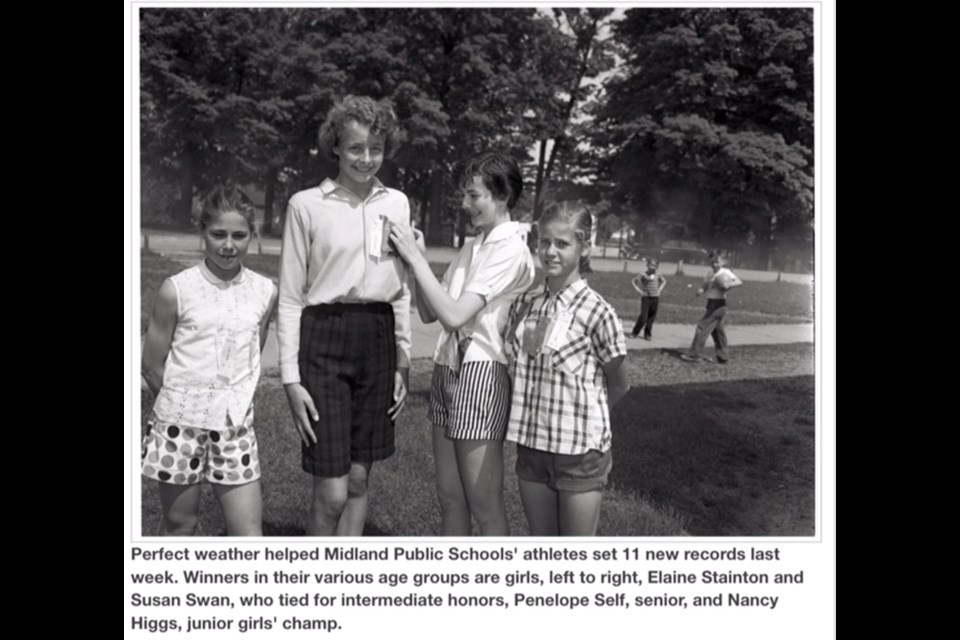As a former journalist who got her start at the Midland Free Press in the mid-60s, best-selling author Susan Swan appreciates good reporting.
“It’s very hard to have democracy if you can’t have newspapers,” says Swan lamenting the loss of some local newspapers over the last few years.
Swan learned an important lesson in fact-checking, accuracy and balanced reporting when she wrote a front-page story in the Midland Free Press about cottagers possibly not being able to access their properties in the winter.
The piece caused a stir, and the owner of the Midland Free Press, who was away when the then-teenaged reporter’s piece appeared on the front page, came back to educate Swan about how to provide solid reporting that offers perspective and checks facts.
The newspaper owner told the fledgling reporter that council couldn’t restrict people from visiting their property.
“He told me, ‘This goes out to hundreds of people, and they’ll believe it,’” she remembers.
Swan says she thinks about this statement a lot now with former-US-president Donald Trump needing constant fact-checking so much that Daniel Dale, a reporter who was then with the Toronto Star, won awards for correcting Trumps consistent inaccuracies.
“This kind of journalism is crucial in a democracy,” says Swan, “Otherwise any idiot can get up and say ridiculous things.”
Swan’s literary work is just as rigorously written and edited and she is credited with recreating this Georgian Bay community well and in detail in The Western Light.
Published in 2012, the novel relives Swan’s experience growing up in Midland in the 1950s. She recreates Midland in all its quaint, small-town glory as a place of wonder and freedom.
“It’s my tribute to what Midland gave me,” says Swan. “It’s a beautiful landscape to grow up in. We had the freedom to roam that children in the cities didn’t have back then.”
Every detail of the novel was researched for accuracy because it is historical fiction — right down to the time when flamingos started appearing on people’s lawns as ornaments in 1957.
The story covers the author’s own upbringing in a hockey-loving or obsessed town.
Back in the 50s, Midland’s mayor listened to or watched the hockey games from the porch in all seasons while his wife signalled the score.
“She was worried he’d have a heart attack,” recalls Swan stifling a chuckle. “Canadians are a hockey loving culture."
Swan remembers a story from her youth that made it into the book when she and her mother witnessed a man climbing the fence behind the goalie’s net at a Toronto Maple Leafs game against the Montreal Canadiens to dispute a referee’s call.
“My mother said, ‘Oh my god! That’s doc’,” says Swan noting that’s what her mother called her father.
The Western Light is a prequel to Swan’s best-selling 1993 novel The Wives of Bath that tells the story of women coming of age at a private school in Toronto in the 1960s.
Swan is the author of eight novels including her latest The Dead Celebrities Club written in 2019.
As a retired professor, Swan remains involved with graduate students pursuing writing careers, and was recently responsible for helping establish the Carol Shields Prize for Fiction open to Canadian and American authors.
“It all started as an attempt to have more of a level playing field,” says Swan.
Swan sat on a panel looking at women’s writing over 40 years. After doing some research, she found only one-third of literary prizes went to women in Canada and the US, and women writers earn only 55 percent of what men do.
Of the 119 winners of the Nobel Prize for literature 17 have been women, including this year’s winner Annie Ernaux. This prize has been awarded since 1895. Since 1918, only 31 of 93 Pulitzer Prize for Fiction awards have been handed out to female authors.
From a strictly Canadian perspective, for the Stephen Leacock Award for Humour, awarded since 1947, only 10 of 74 winners have been women.
The Governor General Award in English has been awarded to women 30 out of 83 times since 1936. The same award began being distributes for French literature in 1959 and has been awarded to women 34 out of 74 times.
Women are starting to win more literary prizes now.
The Scotiabank Giller Prize for Fiction is an excellent example of a more equitable opportunity and has been awarded to female authors 13 of 28 times since 1994.
When everyone at the panel in Vancouver was astonished by these statistics, a group of female authors came together to raise about $3 million for the creation of the Carol Shields prize for fiction.
There are 11 mentoring programs with various organization and universities that provide grants and residencies to emerging female authors.
The thing that grinds Swan the most is that women write just as much as men, but because the top tier of critics are quite often male, when they consider the best authors of the last 30 years they tend to name men.
They often discount women’s writing as ordinary, irrelevant or about domestic issues.
“That’s the great thing about Carol. That’s what she wrote about. Women’s life in a domestic sphere. She wrote away the invisibility of women’s lives with a radical ordinariness.”
In a slice of nothing ordinary, Swan’s next book will be a memoir about growing up as a taller woman in the 1960s called Too Big.
“I was told I was too big to be feminine, because I’m 6’2”,” explains Swan.
Expect that memoir to be published in the near future.
If you can make art from Canada’s love of hockey through literature, and hold the literary world to account in the name of women, what can be more feminine, and radically ordinary than that.



